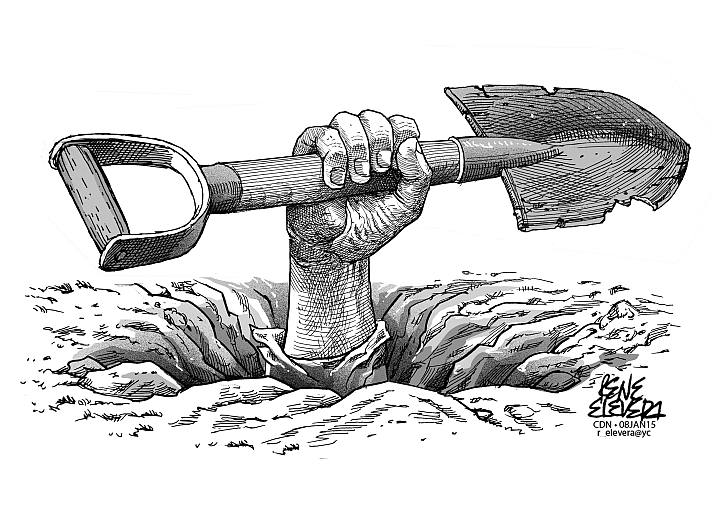Isidro Toledo, barangay chief of Maslog, Danao City said water supply for washing and laundry wasn’t a problem in their area since sources are within walking distance.
This makes it hard to accept hook, line and sinker the alibi given by families whose loved ones died inside an excavated 30-foot-deep pit that the hole in their backyard was a deep well.
Ernesto Ogabao, Jess Christian Miguel and Amick Buconseho died in the depths of the pit they were digging. The hole had overflowed with water in Dec. 26, 2014.
A 19-year-old neighbor, Diomel Mayol, also died trying to help them get out.
Two weeks after the freak accident, police and barangay investigations haven’t given a clear answer to what neighbors were talking about: that the hole was a work site for a treasure hunt.
There were accounts of loud music played at night, when the diggings were done. The hole was fenced off with tarps. Occasional visits by men not from the barangay, bringing supplies made the enterprise more strange.
But all barangay officials and rescuers found in the hole were water pumps, chlorine, cement, tools but no gold. Not even a stockpile of dirt beside the pit.
Initial reports said the victims may have died of electrocution, that a wire of the electric pump could have come in contact with water, whose level suddenly rose. But the families did not want an autopsy. The cause of death remains sealed with the victims in their coffins.
The search for buried treasure, loot from the Japanese occupation believed to be hidden in scattered parts of the Philippines, stems from accounts of the Japanese Imperial Army bringing over spoils of war – gold, silver, precious stones – from Asian countries they had conquered.
However, threads of history mix with urban legend. The most sensational tale was that of President Ferdinand Marcos’ “Golden Buddha” , held up as proof that he had discovered several burial sites and built his wealth on it.
One website of treasurer hunters explains a typical hiding place: “Elaborate tunnels were dug, some down to depths of a few hundred feet, to the final ‘storage chambers’. Many of these tunnels were dug down to just below the water table during dry season, which would also be a deterrent to would-be future salvors.”
Clandestine treasure digs are reported off and on, none of them authenticated. Such projects require capital, the support of financiers and secrecy.
One may add, human labor that is easy to tempt with a promise out of poverty.
It would be an injustice to the victims in Maslog if they were written off as another tragedy of rural residents who put their faith in imagined treasure.
The Dumlog barangay council, Danao city government and police should declare the true nature of the excavation and pinpoint the financiers seen in the neighborhood. Otherwise, the lessons –- and the risks – will not be learned. Somebody else will just resume the quest and dig another tunnel.
Disclaimer: The comments uploaded on this site do not necessarily represent or reflect the views of management and owner of Cebudailynews. We reserve the right to exclude comments that we deem to be inconsistent with our editorial standards.

